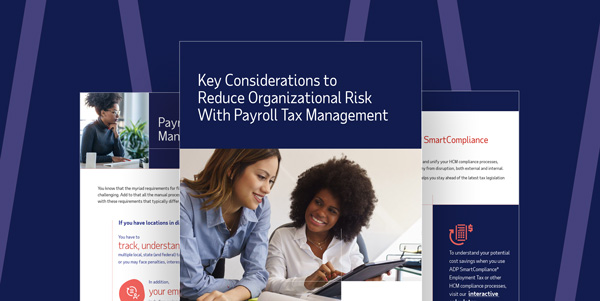Remote work has become increasingly popular amongst employees in recent years, spurring many businesses to offer it as part of their talent acquisition and retention efforts. However, this benefit can cause payroll and regulatory-related challenges, particularly when employees working across state lines are subject to double taxation. Employers must understand the tax withholding laws in every state where they employ people or risk costly compliance violations.
Table of Contents
Double taxation definition
What is double taxation?
Double taxation means that employees pay income tax in their state of residence and the state where their employer is located. This practice is undesirable for workers and makes payroll more complex for businesses. Employers who don’t correctly withhold the requisite taxes for both states could be liable for the tax dues.
Guidebook Navigating multi-state compliance requirements
Who is subject to double taxation?
Individuals who are employed across state lines may be double taxed if they:
- Work while traveling
- Work remotely 100% of the time
- Work a hybrid schedule, e.g., on-site some days and remote others
- Are entertainers, athletes or highly paid, key employees
How does double taxation work?
In many states, a nonresident employee's wages are subject to income tax on the first day of travel to the state for business purposes. Other states have adopted temporary presence rules that delay double taxation until the employee exceeds certain thresholds, such as days worked, income earned or a combination of the two. These grace periods generally do not apply to athletes, entertainers and highly paid employees.
Convenience of the employer rules
Several states and municipalities allow employees working across state lines to pay income tax only in the state where their employer is located. Such rules apply only if the employer does not require the work to be performed out of state.
Reciprocity agreements
Tax reciprocity agreements may exist between neighboring states. In these situations, employers generally withhold income tax only in the state where their employees live, not where they work.
Tax credits
Absent a reciprocity agreement (less than half the states have them), employers must withhold taxes in multiple states. However, employees are not always without recourse. Many states allow their residents to apply for a tax credit if they work in another state that charges them income tax.
Business activity and state corporate taxes
Knowing when double taxation applies to employee income isn’t the only concern with a remote workforce. It could also trigger a nexus or recognized legal presence in the state. Employers might then have to pay corporate and business activity taxes, sales taxes and employment taxes. They may also have to register for state and local licenses and permits. In some cases, these requirements take effect if only one employee is working in a state, regardless of whether the employer has an office or physical presence there.
How to avoid double taxation non-compliance
Remote employees who can get their work done from anywhere may not always remember to advise their employer of a physical location change. To avoid a tax withholding violation, employers must make it easy for employees to share their location and be honest about the legal consequences that may occur if they fail to do so. Here are some ways to achieve these objectives:
- Add an “update address” button on the employee portal home screen.
- Send quarterly notifications requesting confirmation of current address.
- Have an address change trigger an alert to HR staff to check with employees and confirm.
- Send company-wide messages stressing the importance of location accuracy.
- Instruct managers to communicate that corrections often cost extra money.
- Explain that amended withholdings could delay tax filings and tax returns.
Addressing double taxation withholding violations
If all precautionary measures fail and an employee relocates to a new state without notifying management, employers may have to take the following steps:
- Re-educate the employee on the importance of reporting an accurate location.
- Find out the date the employee relocated.
- Correct the location so future taxes are accurate.
- Register the business in the state if it’s not already registered.
- Correct any wages or withholdings reported to the wrong state.
- Produce a corrected Form W-2 for the employee.
- Review any relevant licenses required for the employee’s occupation.
Examples of double taxation and reciprocity
Lilly works for XYZ Company based in New Jersey but relocates to Maine. After exceeding Maine’s temporary presence thresholds for income and days worked, Lilly’s employer begins withholding income tax from her pay for both Maine and New Jersey.
Frank also works for XYZ Company, but is based in Pennsylvania. Because New Jersey and Pennsylvania have a reciprocity agreement, Frank’s employer only withholds income tax from his pay for Pennsylvania.
Frequently asked questions about double taxation
How can individuals avoid double taxation in two states?
It may not be possible to avoid double taxation, depending on the state’s laws and the employee’s status, i.e., athlete, entertainer, etc. However, the following measures may help in some circumstances:
- Understand the temporary presence thresholds when working in a new state
- Work in a state that has a reciprocity agreement with the employer’s state
- Apply for an income tax credit in the state of residence if one is available
Which states have no income tax?
Nine states do not charge income tax – Alaska, Florida, Nevada, New Hampshire, South Dakota, Tennessee, Texas, Washington and Wyoming.
This article is intended to be used as a starting point in analyzing the double tax meaning and is not a comprehensive resource of requirements. It offers practical information concerning the subject matter and is provided with the understanding that ADP is not rendering legal or tax advice or other professional services.




